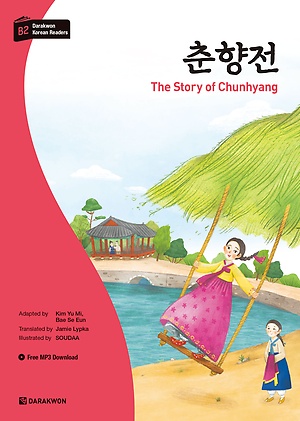
다락원 한국어 학습문고 – 춘향전 (Darakwon Korean Readers - The Story of Chunhyang) PDF
Preview 다락원 한국어 학습문고 – 춘향전 (Darakwon Korean Readers - The Story of Chunhyang)
The “Darakwon Korean
Readers” series is comprised of books that recompose classic Korean
literary works to match the reading levels of students from beginner to
advanced levels (A1~C2) so students can easily increase their Korean
reading comprehension skills in a fun way. The fourth literary work in
this series, “The Story of Chunhyang,” adapts a classic Korean novel
about the meeting of 16-year-old lovers who parted ways due to their
class difference. As students enjoy reading this emotional story about a
dramatic reunion, they can naturally become familiar with vocabulary
words and expressions that are essential for the intermediate level.
In addition, through explanations about the historical background,
students can understand the culture of that time period. Not only can
students read the content, they can also listen to it by scanning QR
codes to hear recordings of professional voice actors reading the story.
Students can also use the English translations of the story and
questions in the appendix at the end of the book to check their reading
comprehension skills.
▪ The “Darakwon Korean Readers” series adapts classic Korean tales into
modern Korean suitable for beginner to advanced levels. Each book
presents vocabulary words and expressions that align with the standards
of the International Standard Curriculum for Korean Language and Korean
Language Education Vocabulary Content Development. Students can have fun
as they easily read and understand each story.
▪ English translations of vocabulary words that are necessary for
understanding the story are presented at the bottom of each page, as
well as additional English explanations about grammar, expressions, and
cultural background, allowing students to concentrate on reading without
using a dictionary. In addition, students can easily check an English
translation of the entire story in the appendix of the book.
▪ Students can listen to lively recordings done by professional voice
actors by scanning the QR code on each page of the story. By looking at
illustrations of the story’s main scenes and listening to the voice
recordings, students can not only improve their listening skills, they
can also vividly understand the emotions of the characters.
▪ Using a variety of questions in the book’s appendix, students can
check their reading comprehension and practice sentence structures and
vocabulary words that they should know for each corresponding level. In
addition, students can compare various cultural situations with Korean
culture through thought expansion questions based on the content of the
story.
